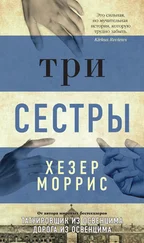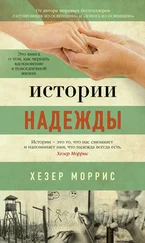Heather Morris
THE TATTOOIST OF AUSCHWITZ
To the memory of Lale Sokolov.
Thank you for trusting me to tell your and Gita’s story.
Lale tries not to look up. He reaches out to take the piece of paper being handed to him. He must transfer the five digits onto the girl who holds it. There is already a number there but it has faded. He pushes the needle into her left arm, making a 3, trying to be gentle. Blood oozes. But the needle hasn’t gone deep enough and he has to trace the number again. She doesn’t flinch at the pain Lale knows he’s inflicting. They’ve been warned – say nothing, do nothing. He wipes away the blood and rubs green ink into the wound.
‘Hurry up!’ Pepan whispers.
Lale is taking too long. Tattooing the arms of men is one thing; defiling the bodies of young girls is horrifying. Glancing up, Lale sees a man in a white coat slowly walking up the row of girls. Every now and then he stops to inspect the face and body of a terrified young woman. Eventually he reaches Lale. While Lale holds the girl’s arm as gently as he can, the man takes her face in his hand and turns it roughly this way and that. Lale looks up into the frightened eyes. Her lips move in readiness to speak. Lale squeezes her arm tightly to stop her. She looks at him and he mouths, ‘ Shh .’ The man in the white coat releases her face and walks away.
‘Well done,’ he whispers as he sets about tattooing the remaining four digits – 4 9 0 2. When he has finished, he holds on to her arm for a moment longer than necessary, looking again into her eyes. He forces a small smile. She returns a smaller one. Her eyes, however, dance before him. Looking into them his heart seems simultaneously to stop and begin beating for the first time, pounding, almost threatening to burst out of his chest. He looks down at the ground and it sways beneath him. Another piece of paper is thrust at him.
‘Hurry up, Lale!’ Pepan whispers urgently.
When he looks up again she is gone.
April 1942
Lale rattles across the countryside, keeping his head up and himself to himself. The 24-year-old sees no point in getting to know the man beside him, who occasionally nods off against his shoulder; Lale doesn’t push him away. He is just one among countless young men stuffed into wagons designed to transport livestock. Having been given no idea where they were headed, Lale dressed in his usual attire: a pressed suit, clean white shirt and tie. Always dress to impress .
He tries to assess the dimensions of his confinement. The wagon is about two and a half metres wide. But he can’t see the end to gauge its length. He attempts to count the number of men on this journey with him. But with so many heads bobbing up and down, he eventually gives up. He doesn’t know how many wagons there are. His back and legs ache. His face itches. The stubble reminds him that he hasn’t bathed or shaved since he boarded two days ago. He is feeling less and less himself.
When the men try to engage him in conversation, he responds with words of encouragement, trying to turn their fear into hope. We stand in shit but let us not drown in it . Abusive remarks are muttered at him for his appearance and manner. Accusations of hailing from an upper class. ‘Now look where it’s got you.’ He tries to shrug the words off and meet the glares with smiles. Who am I trying to kid? I’m as scared as everyone else.
A young man locks eyes with Lale and pushes through the scrum of bodies towards him. Some men shove him on his way through. It’s only your own space if you make it yours .
‘How can you be so calm?’ the young man says. ‘They had rifles. The bastards pointed rifles at us and forced us into this… this cattle train.’
Lale smiles at him. ‘Not what I was expecting either.’
‘Where do you think we’re going?’
‘It doesn’t matter. Just remember, we are here to keep our families safe at home.’
‘But what if…?’
‘Don’t “what if”. I don’t know, you don’t know, none of us knows. Let’s just do as we’re told.’
‘Should we try and take them when we stop, since we outnumber them?’ The young man’s pale face is pinched with confused aggression. His balled-up hands box pathetically in front of him.
‘We have fists, they have rifles – who do you think is going to win that fight?’
The young man returns to silence. His shoulder is wedged into Lale’s chest and Lale can smell oil and sweat in his hair. His hands drop and hang limply by his side. ‘I’m Aron,’ he says.
‘Lale.’
Others around them tune in to their conversation, raising their heads towards the two men before lapsing back into silent reveries, sinking deep into their own thoughts. What they all share is fear. And youth. And their religion. Lale tries to keep his mind off theorising about what might lie ahead. He has been told he is being taken to work for the Germans, and that is what he is planning to do. He thinks of his family back home. Safe . He has made the sacrifice, has no regrets. He would make it again and again to keep his beloved family at home, together.
Every hour or so, it seems, people ask him similar questions. Wearying, Lale begins to answer, ‘Wait and see.’ He is perplexed as to why the questions are directed to him. He has no special knowledge. Yes, he wears a suit and tie, but that’s the only visible difference between him and the next man. We’re all in the same filthy boat .
In the crowded wagon they can’t sit, let alone lie down. Two buckets substitute for toilets. As they fill, a fight breaks out as men try to get away from the stench. The buckets are knocked over, spilling their contents. Lale clings to his suitcase, hoping that with the money and clothes he has, he might be able to buy himself out from wherever they are headed, or at the very least buy himself into a safe job. Maybe there’ll be work where I can use my languages.
He feels lucky to have found his way to the side of the wagon. Small gaps in the slats provide him with glimpses of the passing countryside. Snatched breaths of fresh air keep the rising tide of nausea at bay. It might be springtime, but the days are filled with rain and heavy cloud. Occasionally they pass fields ablaze with spring flowers and Lale smiles to himself. Flowers. He learned from a young age, from his mother, that women love them. When would be the next time he could give a girl flowers? He takes them in, their brilliant colours flashing before his eyes, whole fields of poppies dancing in the breeze, a scarlet mass. He vows that the next flowers he gives to someone he will pick himself. It has never occurred to him that they grow wild in such large numbers. His mother had a few in her garden but she never picked them and brought them inside. He starts a list in his head of things to do ‘When I get home…’
Another fight breaks out. Scuffling. Yells. Lale can’t see what is going on, but he feels the squirming and pushing of bodies. Then there is silence. And from the gloom: the words, ‘You’ve killed him.’
‘Lucky bastard,’ someone mutters.
Poor bastard .
My life is too good to end in this stinkhole .
•
There are many stops on the journey, some lasting minutes, some hours, always outside a town or village. Occasionally Lale catches a glimpse of the station names as they speed through: Ostrava, a town he knows is close to the border of Czechoslovakia and Poland; Pszczyna, confirming they are then indeed in Poland. The unknown question: where will they stop? Lale spends most of the time on the journey lost in thoughts about his life in Bratislava: his job, his apartment, his friends – his female friends in particular.
Читать дальше
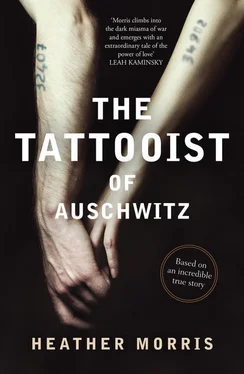

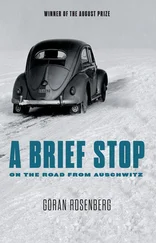

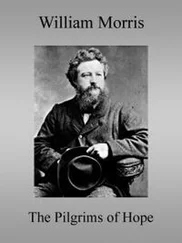


![Хезер Моррис - Дорога из Освенцима [litres]](/books/397846/hezer-morris-doroga-iz-osvencima-litres-thumb.webp)
![Хезер Димитриос - Токсичный роман [litres]](/books/408645/hezer-dimitrios-toksichnyj-roman-litres-thumb.webp)
